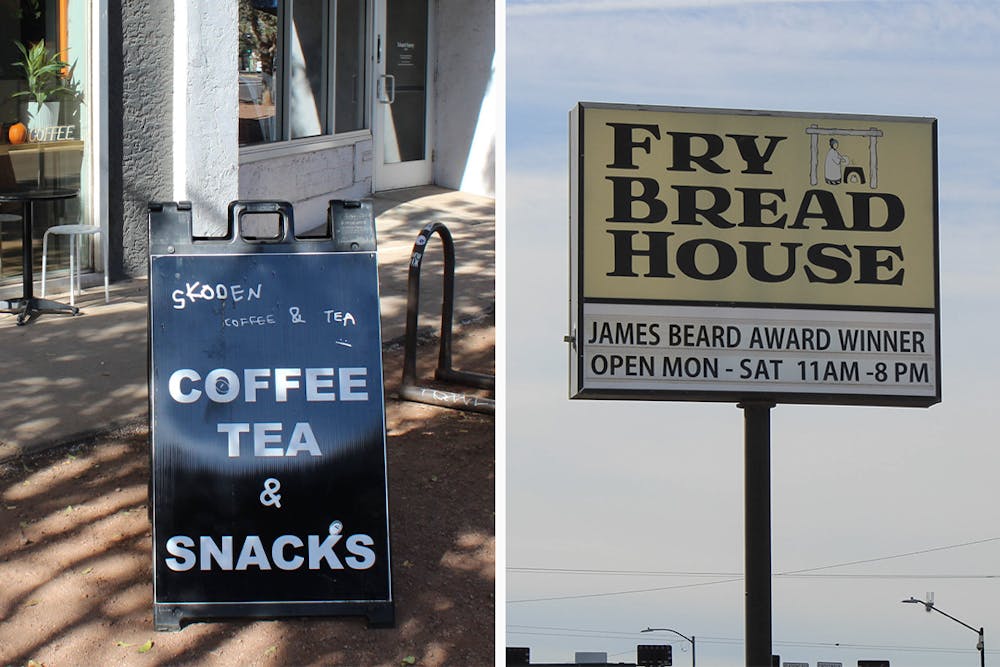Arizona is home to 22 federally recognized tribes, and the state is enriched with their culture, traditional art and foods. So it's time for you to check out some of these Indigenous-owned restaurants and businesses.
Skoden Coffee & Tea
Tucked away in Central Records and about a seven-minute walk away from the Downtown Phoenix campus, Skoden Coffee & Tea offers an inclusive menu to accommodate communities of color.
Originally, the business started in the Navajo Nation and was born under a different concept, but was later moved to Phoenix by co-owner Natasha John, for better accessibility.
"I thought, 'Why can't we be a space for displaced Navajos that are here, in O'odham Jeved, which is occupied Phoenix,'" John said. "That's kind of where the idea came from, was to move the business here, to make it more accessible for natives — Navajos specifically — that, a lot of times, were forced to live in the city because our reservation, our homelands, can't really support us."
The coffee shop also offers a way for people to feel connected within a community that may need a space.
"It's more of a healing space for those who are not able to go back home on the Rez, but also just for people that are like us, that are queer, Indigenous and kind of the black sheep of their family," said Jo Manuelito, co-owner of Skoden Coffee & Tea.
Skoden Coffee & Tea often holds fundraisers for several types of groups and people and tries to give back and support people on the Reservation by mainly using vendors from Navajo Nation. Much of the business', merchandise and even roasters are Navajo-made.
Every Sunday of each month, the shop holds "Auntie's Kitchen," which gives an opportunity for local, Indigenous women to showcase their ancestral foods and promote themselves.
"It really activates the space and that people can share meals from their cultural backgrounds and what they've learned from their matriarchs, and what's passed down in the kitchen through their family for generations," John said.
The drinks sold are also intertwined with ancestral ingredients, John said. Many of the drinks are named after loved ones and use elements that other coffee shops might not offer.
"It's also a process for us for reclamation, or reclaiming a lot of these ingredients that were originally in our diet since we use blue corn and that's why we use juniper ash," John said.
Renaissance Beadwork
Started in March 2024, Renaissance Beadwork is an online business devoted to beaded jewelry, mainly earrings.
Ren Nez, a fifth-year student studying painting and drawing, is the owner of Renaissance Beadwork. They grew up in a family of artists, and their grandparents were silversmiths. They grew up around social gatherings within Indigenous communities that often included vendors and artists who displayed their jewelry.
Nez's desire to make their own work started because they were constantly around art. In college, Nez officially began to learn through a class at ASU called Native Fashion. Since the class, Nez decided to start their own way to share their beading with others.
"My business would offer that anyone can start from anywhere when it comes to wondering what they want, how they want to be, how they want to start their creative journey," Nez said. "With beading it's a way to practice mindfulness because when you're beading, you know your mind is focusing on what you're creating."
Within many tribal nations, beading is considered medicine and when you’re beading with good thoughts a good outcome is expected, Nez said.
"When you're out there beading, you're keeping good thoughts. You're keeping your medicine," Nez said.
Fry Bread House
Located in central Phoenix, Fry Bread House provides a place of gathering for anyone looking to enjoy traditional Indigenous and Tohono O'odham-specific foods. The restaurant earned a prestigious James Beard Award and was even visited by American restaurateur Guy Fieri.
The restaurant was founded in 1992 by Cecelia Miller, a Tohono O’odham woman. It started as a place for Indigenous people to feel comfortable when they had to travel to the Phoenix area due to difficult situations and circumstances, said Richard Perry, a son of Miller and who helps run the restaurant.
"She wanted to try and create such a place where people could gather who may not feel as comfortable in an urban dwelling, urban situation, and so that they could find a little bit of comfort in an establishment," Perry said.
Fry Bread House was created to share Miller's tribal food. The restaurant offers tacos, stews, fry bread and more using family and tribal recipes. Many people even come to the restaurant because they don't want to wait around for the state fair to have fry bread, Perry said.
"It's not only a place where people can come and enjoy Indigenous food and Indigenous recipes for the first time, but it's a place where people can gather and remember the history of not only our family but how the restaurant has grown to where it's at today," Perry said.
Edited by Andrew Dirst, Sophia Ramirez, Tiya Talwar and Natalia Jarrett.
Reach the reporter at sjames51@asu.edu and follow @sennajames_ on X.
Like The State Press on Facebook and follow @statepress on X.
Senna is a sophomore studying journalism and mass communication with a minor in Spanish. This is her fourth semester with The State Press.




